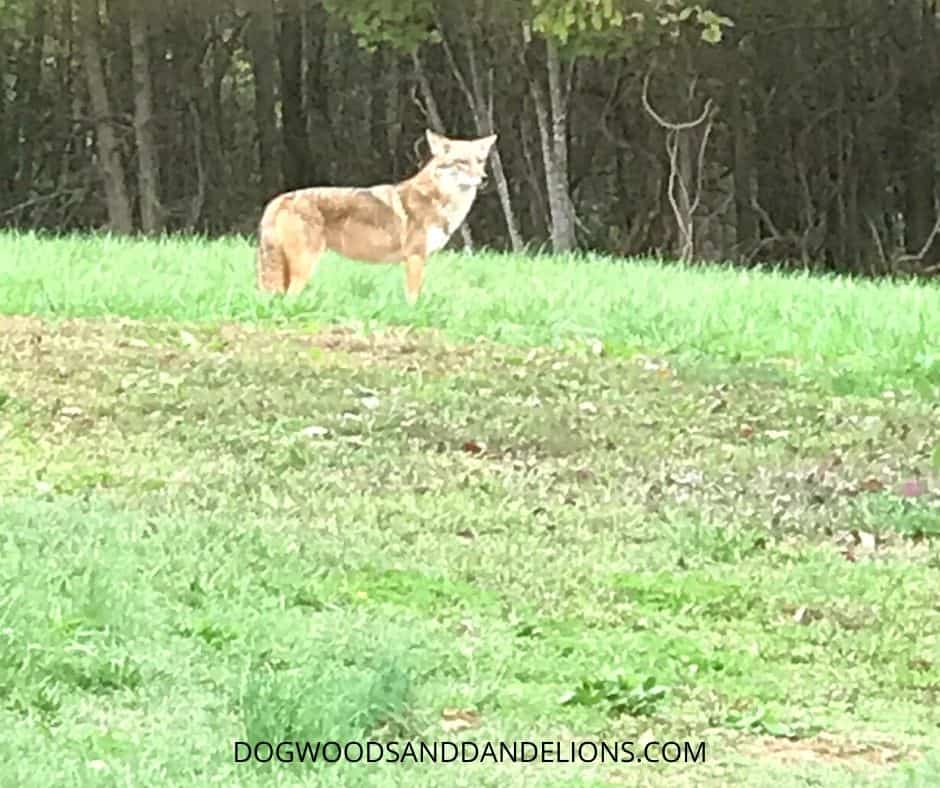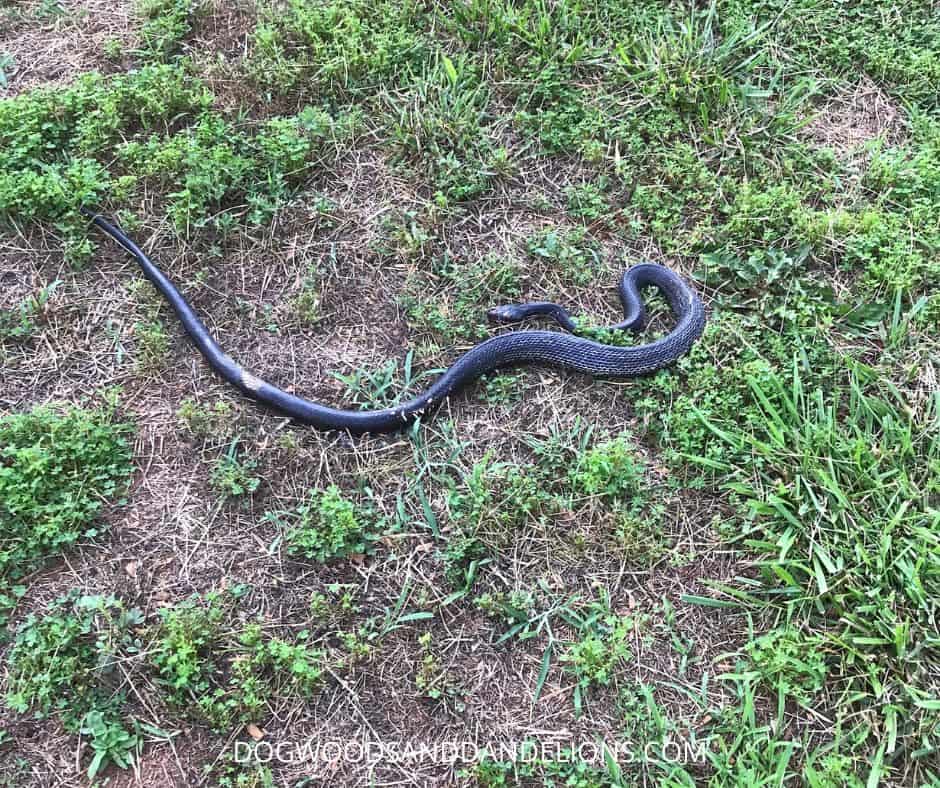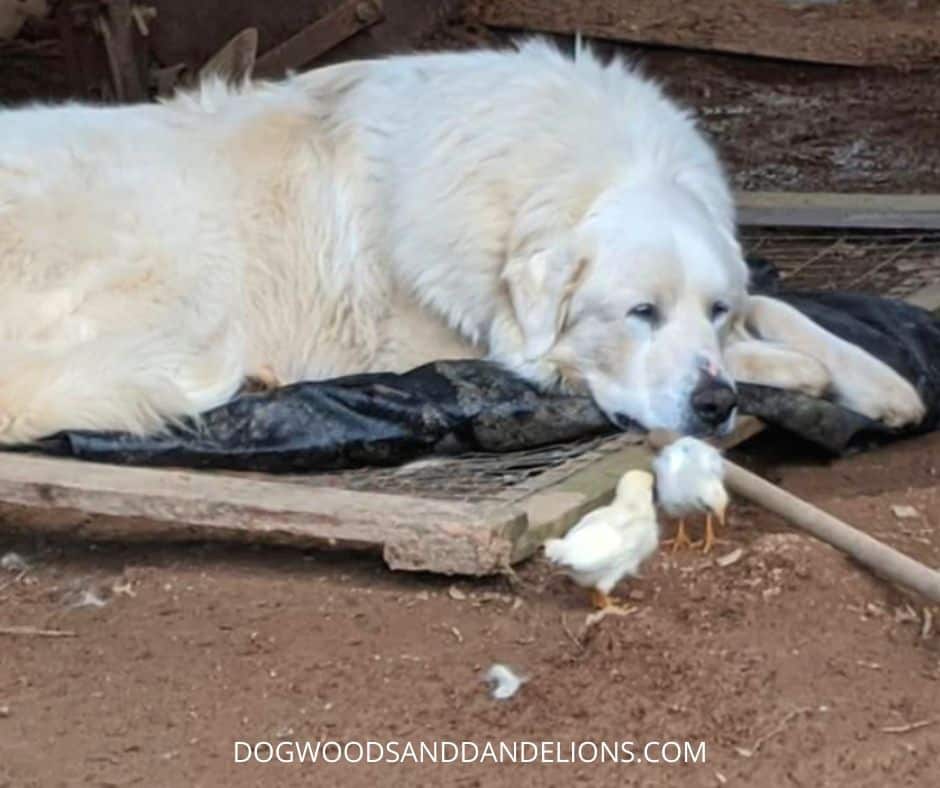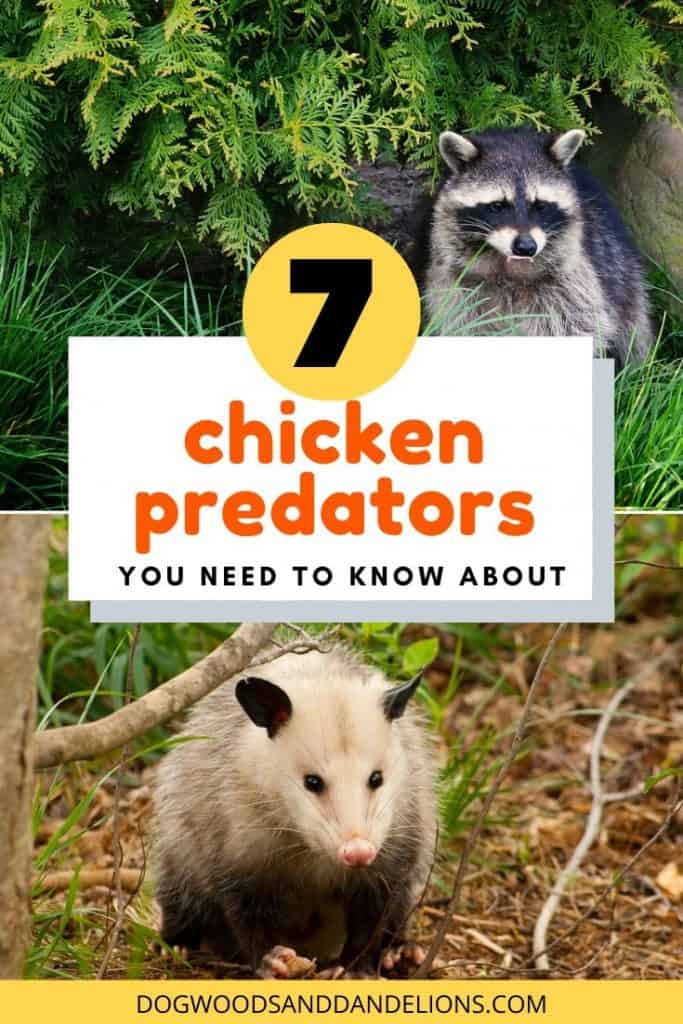Common Chicken Predators
Inside: Whether you live in a rural area or a suburban neighborhood, there are many chicken predators that want to make a tasty meal of your chickens or their eggs. These are the most common ones you may encounter and the best ways to foil them.
Warning: There are a few details of our raccoon attacks that may not be suitable for children to read.
How to Identify Your Chicken Predators
Many times, it can be difficult to know you have chicken predators roaming about until something happens to one of your chickens. However, it is quite devasting to go out one morning and find a dead chicken.
Then you have to figure out what is killing your chickens and an effective way to prevent it from happening again.
The best preventative to a predator attack is to build a secure coop and lock your chickens in it every night. (More on that below.)
You can sometimes identify what larger predators are lurking around by tracks or signs of digging. It is a good idea to regularly walk the perimeter of the coop to look for small holes or signs that something has tried to dig under it.
If you find prints, snap a quick picture and a Google image search will usually help you figure it out.

Affiliate Disclosure: Please note that some of the links in this article may be affiliate links and I may receive a small commission if you purchase something through a link. It will not change your cost. As an Amazon Associate, I earn from qualifying purchases. For more information, see my disclosures page.)
If you really want to know what is moving around your yard at night, I highly recommend investing in a trail cam. My husband bought me one several years ago as a Christmas gift and it has served us well.
Nighttime Chicken Predators
Raccoons
Raccoons are probably one of the most common chicken predators you will encounter. They can be found in the city as well as the country.
We had our share of raccoon attacks when we first started keeping chickens. Luckily, we did some research and learned how to better protect our chickens.
Raccoons are clever creatures that can figure out how to open doors and simple locks.
Raccoons will climb fences to gain access to your birds. They will also try to dig under your coop or run. If a raccoon does get a chicken, many times it will only eat the head, leaving the remaining parts laying around.
Raccoons often travel in pairs, working together to gain access to your birds. Under the cover of darkness, they will often manage to entice your chickens near an opening and snatch the head of the chicken and try to pull it out.
When we had our raccoon attacks early on, we have several chickens in a covered dog kennel with a small wooden box for a coop inside.
The raccoons managed to lure the chickens out of the coop somehow and up against the fence where they tried to drag them through the chain link. They ended up killing the chicken and eating just the head and neck, leaving the remaining body inside the fence.
The best way to prevent a raccoon attack is to keep your chickens locked up at night in a very secure coop with very good locks. Don’t rely on chicken wire (also called poultry wire) to keep raccoons out.
They can tear through chicken wire quite easily. It is much better to purchase hardware cloth no larger than 1″ wide.
Also, while chain link fencing is strong, the openings are too big to keep a chicken from poking its neck out and getting attacked. Learn from our mistake. One-inch hardware cloth is the way to go. If you are raising baby chicks outdoors, I recommend 1/2″ hardware cloth.
And be sure your locks on the coop are more than just a door handle. Raccoons can use their opposable thumbs to twist handles and open simple latches. We have locks that require two steps to open on our coops.
Coyotes
While years ago, there weren’t coyotes around these parts, there are now. Many nights you can hear them howling in the distance.
Coyotes aren’t just a country critter either. Several of my friends that live in nearby towns and more urban areas have seen them in their neighborhoods in the early daylight hours.

Coyotes are likely to try to get your chickens by digging under your coop or run. A secure floor in the coop and fencing turned out at the bottom of the run will keep coyotes away from your chickens.
Opossums
Opossums are not nearly as aggressive as raccoons nor are they as smart. But that doesn’t mean they won’t kill a chicken that didn’t get locked up in the coop at night.
Opossums are nocturnal predators that are creatures of opportunity. They want an easy meal. They aren’t likely to dig under a run or even attack a chicken if there are other food sources available. But they are good climbers.
Opossums will eat chicken feed and food scraps if they are readily available. They also will eat chicken eggs if they get in the coop or find them outside.
Want to learn more about raising backyard chicks? Get my free Chick-Raising Success Guide with 3 things you need to know to raise baby chicks (and none of the things you don’t!).
Owls
Owls will prey on chickens at night as well. If they are locked securely in the coop, your chickens will be safe.
Several years ago, we had an owl perch on our chicken ark shortly after we had moved our baby chicks to the coop.
While the hungry owl was unable to get my chicks, he hung around for several hours before he realized he wasn’t going to get a chicken meal. (We love keeping our trail cam around to keep an eye on what kinds of critters and unwanted visitors we have moving about.)
Other Nighttime Predators
There are a few other nighttime chicken predators worth mentioning. Foxes, weasels, and skunks will prey on chickens or their eggs if given the chance.
If you have a secure coop, a fox is not likely to be a big threat, but weasels will squeeze in small openings and kill chickens just for the fun of it. And skunks usually won’t bother the chickens at all, but they will eat their eggs if given the chance.
Daytime Chicken Predators
You may think that during the day, your chickens are perfectly safe free-ranging in your backyard. However, that is not always the case. There are several animals that will prey on your chickens even in broad daylight.
Hawks
Hawks and other birds of prey will swoop down and carry off a baby chick very easily but they can also carry off full-grown birds too. They have also been known to corner a full-grown chicken in a chicken run and eat it right there.
The best protection to prevent a hawk attack is to only allow your chickens to free-range when you are outdoors being very vigilant. Or only allow your flock to roam in an area that is covered by fencing or bird netting.
Hawks are a protected species so you don’t have many options for protecting your flock. And like many other predators, they are in the city as well as rural areas.
Read More: How to Protect Your Chickens From Hawks
Dogs
While you may be surprised to see dogs on this list, they are actually the most common chicken predator during the day. Domestic dogs are probably responsible for more daytime chicken deaths than any other creature.
Dogs have an instinctive nature to hunt and kill so it can be difficult to train dogs to leave your chickens alone unless you have a livestock guardian dog (LGD).
One of our neighbors has an LGD that will babysit the little chicks and break up fights between adult chickens. However, he has had lots and lots of training.
Many chickens have been killed by a neighbor’s dog attacking a chicken in their own yard. Chickens and dogs don’t understand property lines so just keeping your chickens in your own yard won’t ensure their safety.
And there is always the threat of stray dogs roaming through your yard. A hungry stray dog wouldn’t hesitate to make a meal off of a free-ranging chicken.
Snakes
While snakes aren’t likely to attack your chickens for a meal, they may try to bite one that crosses its path.
Snakes will also gladly eat your chicken eggs. Several years ago, I found a snake curled up in a nest box, happily swallowing eggs.
You’ll most likely be able to tell how many eggs the snake has eaten by the number of lumps down his body. Snakes swallow the eggs whole and won’t stop with just one. This snake had consumed 5 of our eggs before we found him.
And once a snake has found your egg supply, unless you move him far, far away, he will likely be back for more.

Unfortunately, it is hard to keep snakes out of the coop. They can slither in through very small cracks and if you keep the coop doors open during the day so the chickens can come and go to lay their eggs, a snake can easily get in that way too.
My only advice is to NEVER reach in a nest box without looking. Always keep a stick nearby to move the nest box curtains out of the way before reaching in to get the eggs.
Ways to Keep Your Chickens Safe From Predators
Keeping your chickens safe from predators should be your main focus when building a chicken coop. You need to know what wild animals are likely to be in your area.
You should also consider these threats before you decide whether or not to free-range your flock. As chicken owners, it is your job to keep your flock safe from predator attacks.
Build a Secure Chicken Coop
When building your coop, use hardware cloth no larger than 1″ wide, but 1/2″ is preferred. Either bury the wire for the perimeter of the chicken run 12″ in the ground or turn the wire out 12″ to the outside to keep predators from digging under the coop and run.
Cover all windows with hardware cloth also. Do not expect chicken wire or poultry netting to keep out potential predators. Hardware cloth is your best defense in both the coop and run to keep critters from trying to get in your coop.
If you only have a few chickens in your backyard, you might want to consider building a moveable coop such as a chicken tractor. This allows a small flock of chickens access to fresh grass while keeping them safe.
The absolute best way to keep your chickens safe is to build a secure coop and run. Enclose the run with hardware cloth and use wire fencing over the top of the run too.
For 100 percent protection, never allow your chickens to free range. This isn’t always practical, however.
Chickens like to forage and it can be great for their health as well as your eggs. So there are a few other options you might want to consider.
Use Electric Fencing
During the day, electric fencing can help protect your flock. It can allow you to free-range chickens and provide some security against common predators, though it isn’t fool-proof.
You can choose to set up an electric fence which is more permanent or use moveable electric netting which has become popular over the years. Electric netting allows you to easily move your chickens to fresh grass every so often.
Stay Outside With Your Flock
If you do decide to free-range your flock, stay outdoors with them while they roam about. The presence of a human will help deter many predators. This isn’t a foolproof method though.
I have heard of chickens wandering into the woods and being snatched by foxes and other animals. It only takes a second for a hawk to swoop in and snatch a chicken or a stray dog to run into the yard and attack. Even your neighbor’s dog that poses no danger to you might still kill a chicken for sport.

Consider A Livestock Guardian Dog
Another alternative if you have lots of chickens is to consider getting a Livestock Guardian Dog (LGD) like a Great Pyrenees or another chicken-friendly breed. LGD’s are wonderful to keep predators away from your backyard flocks, especially if you allow your chickens free-range of the yard.
However, a LGD takes up to 2 years to properly train and the training is quite extensive. And the amount of training can vary by dog.
Our neighbor (that I mentioned above) has 2 LGDs. One was very easy to train. The other one has been rather difficult. So while a guard dog is a good option, it is definitely not the easiest or cheapest method to protect your adult birds.

Whether you live in the city with a few backyard chickens or in the country with a farm full, there will always be chicken predators. It is your job as a chicken keeper to keep your flock safe.
A predator-proof chicken coop will go a long way toward protecting your flock at night while a large enclosed run can give your chickens a safe place to hang out during the day.
What are the most common types of predators or biggest threats to chickens in your area?
Related Posts
- What do you really need when you build a chicken coop?
- When can you move your chicks to the coop?
- How to prepare your chickens for the winter

Meet Julie
I’m a farm girl born and bred in North Carolina. I’ve been growing a vegetable garden for over 20 years (and helping my Mom grow hers even longer). I’ve been raising chickens in my bathtub and backyard for 12+ years. I believe that homegrown food can be made simple. Let’s get started.




Skunks – very much like raccoons, they travel in 1-2 and are nocturnal. They will climb a tree or dig under to get past the fencing. They are very adept at pulling down a roosting chicken and killing isn’t.
Wow. I didn’t realize skunks were so crafty. Thanks for the information.